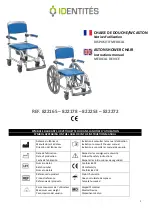
20
www.pridemobility.com
Kids UP Series
Ensure that restraints are not held away from the child’s body by wheelchair components.
Adjust the belts so that the belts fit as snugly as is comfortable for the child.
Install belt restraints that comply with the provisions of ANSI/RESNA WC/Vol. 1, Section 19.4.9.2 through
4.9.5 and 5.2 that have been dynamically tested in accordance with Annex A and 5.3 of the same, for use as a
restraint in a motor vehicle.
Postural supports and belts may be used in addition to the occupant belt restraint, but should not be used as a
replacement of the occupant restraints that have been designed and tested for this purpose.
Preferred pelvic belt angle-range.
See figure 18.
Steeper side-view pelvic-belt angles are especially important if the pelvic belt is intended to be used for
postural support in addition to occupant restraint in a frontal crash.
Steeper angles will reduce the tendency for a vertical gap to develop between the user and the belt due to
compliance of seat cushions and belt movement. This will reduce the tendency for the user to slip under the
belt and for the belt to ride up on the child’s abdomen during normal use.
Steeper belt angles reduce the tendency for upper-torso belts to pull the pelvic belt into the abdomen during
frontal impact loading.
Remove auxiliary equipment from the wheelchair and secure the equipment in the vehicle during transit.
Remove wheelchair-mounted trays from the wheelchair and secure the trays in the vehicle during transit.
Do not perform alterations or substitutions to the structure and frame components without consulting your
Quantum Rehab Provider.
Follow the specifications for the recommended safety zone.
See figure 19.
Ensure that the recline and tilt features place the child in an upright position and never exceed a 30º (from
vertical) recline when using the wheelchair for transport.
Ensure that the ACTIVE handle lever (located on the front of the ACTIVE handle) is in the OFF position
(parallel to the ACTIVE handle).
Always drive carefully to minimize excessive force on the tie-down system.
I I I . Y O U R W H E E L C H A I R
Figure 18. The Kids UP Preferred Pelvic Belt Angle
Figure 19. The Kids UP Recommended Safety Zone
45°
30°
75°
Preferred Zone
Optional Zone
1.2 m
65 cm
40 cm
20 cm
20 cm
















































